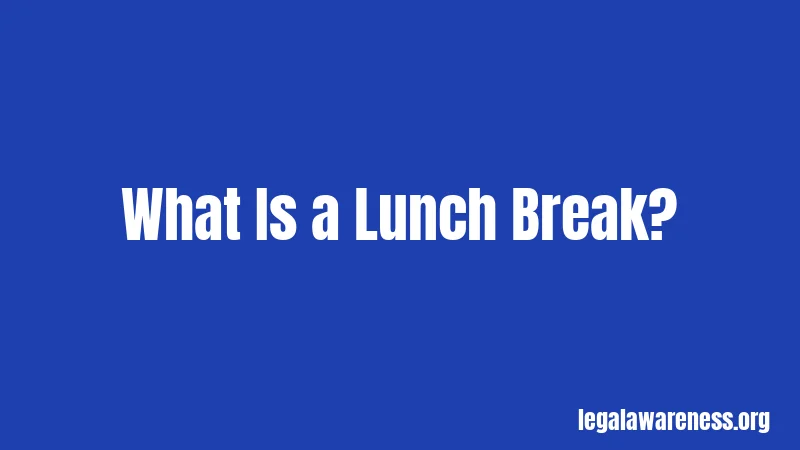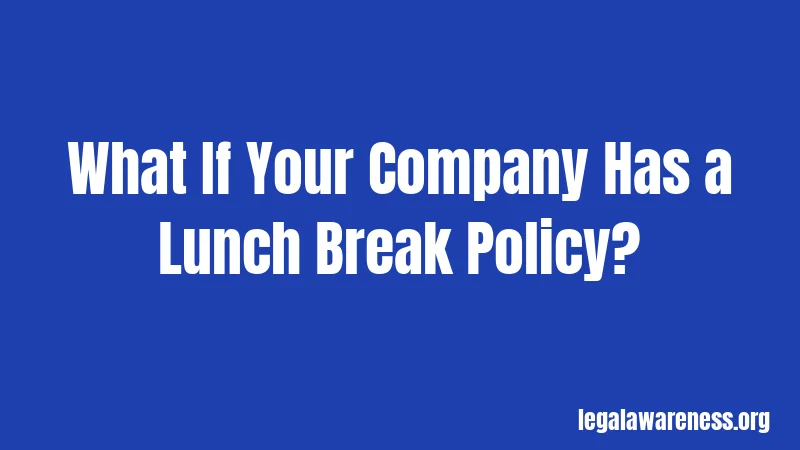Lunch Break Laws in Virginia (2026): What You Really Need to Know
Most people have no idea how loose Virginia’s lunch break laws actually are. Seriously. You’d think there would be strict rules, but Virginia takes a pretty hands-off approach. Here’s what that means for you and your paycheck.
If you work in Virginia, you’re about to learn something that might surprise you. The state doesn’t mandate lunch breaks the way a lot of other states do. That doesn’t mean your employer can do whatever they want, though. Let’s break down exactly what the law says.
What Is a Lunch Break?

A lunch break is time off work during your shift when you’re free to do what you want. You can eat, scroll your phone, take a nap—whatever. The key thing is you’re not working and (usually) not getting paid.
Different from a break? Honestly, yeah. Breaks can be 5 or 10 minutes. Lunch is typically 30 minutes to an hour. That’s the general idea, anyway.
Virginia’s Lunch Break Requirements
Here’s where it gets interesting. Okay, pause. Read this carefully.
Virginia has NO state law requiring lunch breaks. Not for most workers, anyway. The state doesn’t mandate that employers give you a lunch break at all. Sounds wild, right?
That means your boss doesn’t have to give you a lunch break by law. They can technically run you straight through a full shift without a break. But wait—it gets more complicated.
Who Gets Protected?

Not everyone is left hanging. A few groups have extra protections.
Child Workers (Minors) If you’re under 18, Virginia has different rules. You can’t work too many hours without breaks. But here’s the thing: even for minors, Virginia doesn’t have a specific law saying “you get a 30-minute lunch break.” Instead, it limits how long minors can work without rest periods. The state focuses more on total hours and consecutive work time than on actual meal breaks.
Federal Law Protections Here’s what most people miss. Some workers ARE protected, but not by Virginia law—by federal law. If your company has more than 50 employees or does certain types of work, federal rules might apply. Federal law (Fair Labor Standards Act) also doesn’t require lunch breaks. But many industries have their own standards.
When Your Boss Might Have to Pay for Lunch
Stay with me here. This part matters.
If you’re not actually on a lunch break—if you’re still working—you have to get paid. That’s true everywhere, including Virginia. Even if your boss calls it a “lunch break,” if you’re answering emails, helping customers, or doing any work at all, you’re working.
This is where a lot of people get confused. You might think you’re on a lunch break. Your boss might call it a lunch break. But if you can’t actually step away, you’re working, and you need to be paid for it. It’s that simple.
What counts as “working during lunch”? You’re working if you’re answering calls, checking work emails, helping other employees, or basically doing anything related to your job. You’re not working if you’re truly free to do whatever you want.
What If Your Company Has a Lunch Break Policy?

Most Virginia companies do have lunch breaks, even though they’re not required to. If your employer has a written policy or employee handbook that says you get a lunch break, they have to follow it.
That’s the trade-off. If they give you a lunch break, they can control how it works. But they have to stick to what they said. Don’t like your lunch break policy? You have an argument that the policy is unfair, but you don’t have Virginia law backing you up.
Part-Time vs. Full-Time Workers
Wondering if this applies to you? Let me break it down.
Full-Time Workers Full-time employees (typically 35+ hours per week) might have lunch breaks through company policy, but Virginia doesn’t require it. Most full-time workers do get lunch breaks because that’s standard in most industries.
Part-Time Workers Part-time workers get even fewer protections. If they’re not covered by federal law or a company policy, they might not get lunch breaks at all. A 4-hour shift could technically be one straight stretch of work with no break.
Gig Workers and Contractors If you’re an independent contractor or gig worker, this doesn’t apply to you. You’re not an employee, so you’re not covered by labor laws the same way.
What About Overtime and Lunch Breaks?
Okay, this one’s important. If you work overtime, do you get extra meal breaks?
Virginia doesn’t say. There’s no law requiring that. If you work a 10-hour day, you don’t automatically get two lunch breaks. Your employer decides that based on their policy.
Federal law says the same thing. Overtime means extra pay, but it doesn’t guarantee extra breaks. Some companies give them anyway (that’s nice of them), but they’re not required to.
What Happens If Your Employer Violates the Rules?
Not sure what counts as a violation? Let me break it down.
If You Work Through Your Break Without Pay This is the main violation. If you have a lunch break scheduled, can’t use it, and don’t get paid for that time, you have a problem. You should get paid for every hour you work, even if your boss calls it a break.
If Your Boss Takes Your Lunch Break Away If your company policy says you get a lunch break and they stop giving it to you, that’s a change to your employment terms. You might have a claim depending on your situation and any contracts you signed.
If You’re a Minor and Overworked Minors have slightly more protection. If you’re under 18 and your employer isn’t following rest period rules, you have recourse. Virginia’s child labor laws are stricter than meal break laws.
How to File a Complaint
You’ve got options if something feels wrong. Here’s what to do.
Step 1: Check Your Employee Handbook First, look at what your company promised. If they said you get lunch breaks and aren’t giving them, you have a paper trail. That helps.
Step 2: Talk to Your Employer Seriously, start here. Sometimes it’s just a misunderstanding. Your boss might not realize you haven’t had a break. A quick conversation clears things up fast.
Step 3: Contact the Virginia Department of Labor and Industry If talking doesn’t work, you can file a complaint. Virginia’s Department of Labor and Industry handles wage and hour issues. You can file online or call them. They’ll investigate whether you’re being paid correctly for all hours worked.
Step 4: Consult an Employment Lawyer If you’re looking for compensation or things are really complicated, an employment lawyer can help. Many offer free consultations. They can look at your situation and tell you if you have a case.
Recent Changes and Updates
Virginia hasn’t changed its lunch break laws in years, honestly. The state’s approach has stayed the same: minimal requirements, lots of flexibility for employers.
The real changes have happened at the federal level. The federal government keeps updating wage-and-hour rules. If you work for a larger company or in certain industries, federal rules might affect you more than Virginia law.
Special Situations to Know About
Paid vs. Unpaid Lunch Here’s what you need to know. If your lunch break is unpaid, you’re supposed to be completely off work. No emails, no calls, nothing. If you get paid for your lunch, you’re working, even if you’re eating.
Working for the Government If you work for Virginia state or local government, you might have different rules. Government employees sometimes have union contracts or civil service rules that include lunch break requirements. Check your specific agreement.
Working for the Federal Government Federal employees in Virginia get lunch breaks under federal rules, not Virginia law. Federal government employees typically get 30-minute to 1-hour unpaid lunch breaks daily.
Sales, Retail, and Service Workers These jobs sometimes have strict lunch break schedules based on coverage needs. You might not get to choose when your lunch break is. But that’s about scheduling, not whether you get a break at all.
Penalties and Consequences
Okay, pause. Read this carefully. This part matters.
What Happens to Your Employer? If your employer violates wage laws—like not paying you for hours worked—they can face penalties. Virginia allows you to sue for back wages plus penalties. You can recover what you should have been paid, sometimes with additional money on top.
How Much Money Are We Talking? It depends on your situation. If you weren’t paid for 1 hour per week and worked for a year, that’s roughly 52 hours of unpaid work. Let’s say you make $15 per hour. That’s $780 you should have been paid. Some cases allow for penalties on top of that.
Can Your Boss Retaliate? Nope. It’s illegal for your employer to fire you, demote you, or punish you for complaining about wage violations. That’s retaliation, and it’s against the law. If it happens, you have another legal claim.
Other Consequences Repeat violations can lead to bigger penalties. If the Department of Labor finds that an employer repeatedly violates the law, they can increase fines and take stronger action.
Frequently Asked Questions
Do I have a legal right to a lunch break in Virginia? No. Virginia doesn’t require employers to give lunch breaks except in specific situations (like for minors). Your right to a lunch break comes from your company’s policy, not state law.
If my boss won’t let me take my lunch break, can I sue? Maybe. If your employee handbook promises a lunch break and you can’t use it, you might have a claim. You’d need to talk to a lawyer about your specific situation.
Am I required to be paid during my lunch break? Only if you’re actually working. If you’re completely off duty, you don’t have to be paid. But if you answer work calls or emails, that’s work, and you should be paid.
What if I’m a minor working in Virginia? You have more protections. Virginia limits how long minors can work and requires rest periods. The exact rules depend on your age and the type of work.
Can my boss reduce my hours instead of giving me a lunch break? That’s not a legal issue. Employers can structure work however they want—through shorter shifts, longer shifts with breaks, or however. The law only cares that you’re paid correctly for hours worked.
Final Thoughts
Virginia’s lunch break laws are pretty simple once you get the hang of them: the state doesn’t require them, but you still have protections. The main rule is that you must be paid for every hour you work, no exceptions.
If your employer promised you breaks and isn’t delivering, or if you’re working without getting paid, that’s a problem worth fixing. Start by reviewing your employee handbook and talking to your boss. If that doesn’t work, the Virginia Department of Labor and Industry is there to help.
Stay informed. Know your rights. When in doubt, look it up or ask an employment lawyer. They’re there to help, and many offer free consultations.
References
Virginia Department of Labor and Industry – Wage and Hour Laws
Virginia Code – Chapter 2.3: Wage and Hour Laws
Fair Labor Standards Act (Federal Requirements)
